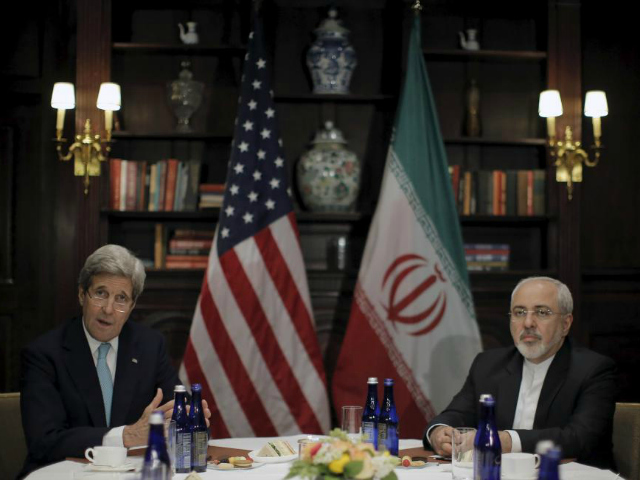U.S. Secretary of State John Kerry met with Iranian Foreign Minister Mohammad Javad Zarif at the United Nations in New York on Friday to discuss more sanctions relief for Iran, which has complained the benefits promised in President Obama’s nuclear deal are arriving too slowly.
“I fully expect that they will continue to talk about the sanctions relief process and the degree to which banks, foreign and domestic, as well as institutions, foreign and domestic, are evaluating their options under the JCPOA,” said State Department spokesman John Kirby, as reported by Reuters.
That sounds ominous, but Kirby added there will not be any representatives from the U.S. Treasury Department at the meeting, which should limit Kerry’s ability to make concessions to Iran.
Also, Kirby helpfully insisted that the administration does not “share Tehran’s view that a U.S. Supreme Court decision that almost $2 billion in frozen Iranian assets must be turned over to American families of people killed in the 1983 bombing of a U.S. Marine Corps barracks in Beirut and other attacks constituted ‘theft.'”
That is one less thing for the American people to worry about, but there is still plenty of reason to fear even more rewards will be heaped upon Iran, while it takes every opportunity to flaunt the nuclear deal, continue with ballistic missile development, and declare its animosity toward the United States.
Sen. Tom Cotton (R-AR) moved on Thursday to block the confirmation of President Obama’s nominee for Under Secretary of Terrorism and Financial Crimes, Adam Szubin — not because of any particular problem with Szubin, whom Cotton described as “well-respected on both sides of the aisle, having worked in the former Bush Administration,” but because of the Iranian nuclear deal.
“Cotton believes that the White House has lied to, and continues to lie to, the representatives of the American people about the Iran nuclear deal, specifically right now about letting Iran have access to the dollar, which the White House said would never happen,” the Weekly Standard reports. Cotton said he objected to Szubin’s nomination as part of the effort to hold someone in the administration responsible.
Cotton specifically mentioned Iran being given access to the U.S. dollar in his allegations of Obama administration dishonesty, noting that the president originally vowed it would never happen, but Kerry’s last meeting with Zarif strongly suggested the dollar was on the table.
The Wall Street Journal wrote that Kerry’s previous meeting with Zairf on April 19 was “centered on ways in which the U.S. could help remove the banking obstacles to allow Iran to re-engage in global trade and finance” and that Iran specifically “expected” easing of the dollar ban “in the spirit of” the nuclear agreement.
The Standard notes that critics say Kerry’s “bizarre” recent statements on Iran sound as if he’s “reading from Iran’s talking points” and “making the Iranians’ argument that they’re not getting their money quickly enough.” Kerry’s deviations from Iranian talking points always seem intended to shield Iran from congressional criticism, such as his assertion that only $3 billion in frozen funds have been released to Tehran so far… while the Iranians themselves say the figure is $100 billion.
Given this history, there is reason to be skeptical about whatever the administration says Kerry and Zarif discussed in New York on Friday, and there is reason to believe Team Obama is still listening very attentively to Iran’s demands. It is a safe bet that Iran will get the access to the American dollars that it craves, and more.
After all, Tehran still has the ultimate leverage over Obama: they know he can’t afford for his “historic” nuclear deal to collapse, while Iran can announce the U.S. has reneged on the deal and walk away at any time, now that sanctions have been irreversibly lifted, and military action against the Iranian nuclear and missile programs is off the table.

COMMENTS
Please let us know if you're having issues with commenting.